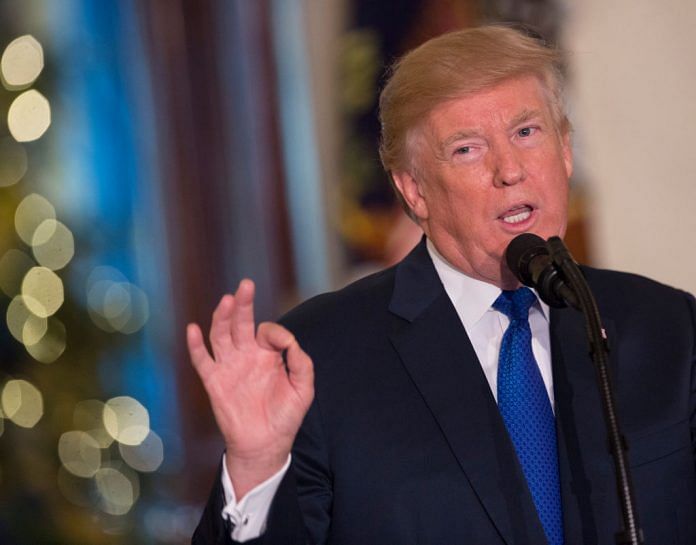Former US president Barack Obama warns against ‘strongman politics’ in highest-profile speech since leaving office, and China’s most expensive film has been pulled from theatres.
After fury, Trump clarifies Helsinki remarks
US President Donald Trump has said he “misspoke” during his much-criticised news conference with Russian President Vladimir Putin, where he had implied greater trust in Moscow than in his own intelligence officers, reports CNN.
“In a key sentence in my remarks I said the word ‘would’ instead of ‘wouldn’t’,” Trump said Tuesday, after a review of a transcript and video of the conference. “The sentence should have been: ‘I don’t see any reason why it wouldn’t be Russia,'” he said, “Sort of a double negative.”
“He voiced support for US intelligence agencies — a day after he had refused to accept their findings on Russia’s election interference over Putin’s denials — and vowed to take action to prevent further attacks,” the report adds.
“I accept our intelligence community’s conclusion that Russia’s meddling in the 2016 election took place,” Trump said. But diverting from his typewritten notes, CNN reports, the President added: “It could be other people also. A lot of people out there.”
Obama cautions against ‘strongman politics’
In his highest-profile speech since leaving office, former US president Barack Obama spoke against “strongman politics” a day after Trump’s meeting with President Putin, reports The New York Times.
“Look around,” he said. “Strongman politics are ascendant suddenly, whereby elections and some pretense of democracy are maintained, the form of it, but those in power seek to undermine every institution or norm that gives democracy meaning.”
“That kind of politics is now on the move,” Obama said. “It’s on a move at a pace that would have seemed unimaginable just a few years ago. I’m not being alarmist; I’m simply stating the facts.”
Without mentioning Trump by name, Obama warned against nationalism, xenophobia and bigotry in the United States at an event in South Africa marking the 100th anniversary of Nelson Mandela’s birth.
A full transcript of his speech is available here.
Thailand plans to legalise medical marijuana
“Thailand, known for its tough policies against drug trafficking, is taking a page from Canada and other countries and is seeking to lead the way in Asia in legalising medical marijuana,” reports Bloomberg.
The reasons are largely economic. Thailand used to be one of the world’s biggest exporters of cannabis in the 1980s, and now wants to reap the benefits of the over $10 billion marijuana market.
“As more countries embrace the medicinal qualities of cannabis, the Government Pharmaceutical Organization — under the ministry of public health — is trying to persuade the military government to approve studying the drug so it can market it for medical use,” the report states.
The Thai government still wants to maintain its tough reputation against drug trafficking, however, and has been continuing with drug busts. State media reports that, in June, the government destroyed narcotics worth $390 million.
China’s epic flop pulled from theatres
After just three days at the box office, producers have yanked China’s most expensive film off movie screens, reports The South China Morning Post.
The film, Asura, is a fantasy epic based on Buddhist mythology. It cost $112 million, making it the most expensive Chinese film ever made, but had a disastrous opening weekend with collections of just $7.3 million.
“The surprise announcement was posted on the film’s official Weibo account — the Chinese equivalent of Twitter — which did not give a specific reason for the decision (for pulling the movie out of theatres),” the report adds. Instead, the produces extended their “deepest apologies to viewers who did not get a chance to watch the film, as well as to all the Chinese and international participants who were involved in its production over the past six years”.
A new kind of football diplomacy
“In any other diplomatic setting, it would have been a funny, even insignificant gesture: One president handed a soccer ball, a symbol of teamwork and competition used in the most popular sport in the world, to another, just after the World Cup final,” The New York Times wrote after President Putin gave President Trump a football during their joint news conference Monday.
In this case, however, the ball is apparently a “metaphor for the gamesmanship that Mr Putin’s many critics say he is well-versed in — and for how he has scored points against an ill-prepared American leader in this high-stakes diplomatic exercise”.
Political analysts and lawmakers think that the gift was a highly symbolic move after a very symbolic news conference, in which Trump seemingly sided with Putin over American intelligence agencies.
China’s ‘trying to clamp down on protest against Xi Jinping’
“China’s public security authorities are clamping down on grass-roots movements around the country that criticise President Xi’s tightening grip on power as an ‘attempt to promote the cult of personality’,” reports the Asahi Shimbun, a Japanese newspaper.
Top leaders of the Communist Party are reportedly concerned about the spread of protest movements. A woman in Shanghai is suspected to have gone missing after a video of her protesting against Xi’s “political tyranny” went viral on YouTube.
Her video, where she asked viewers to “spray black ink on the dictator’s face”, was followed by posts that showed people smearing mud on signs bearing Xi’s face.
“The number of signs featuring Xi’s photo and his political slogans has surged since the party’s once-every-five-years National Congress last autumn,” reports the Asahi Shimbun. “But many are wary of Xi’s power in light of the excessive cult of personality under the leadership of Mao Tse-tung that led to the Cultural Revolution, about a decade of violence from the mid-1960s in which politicians and academics against Mao were slaughtered.”



